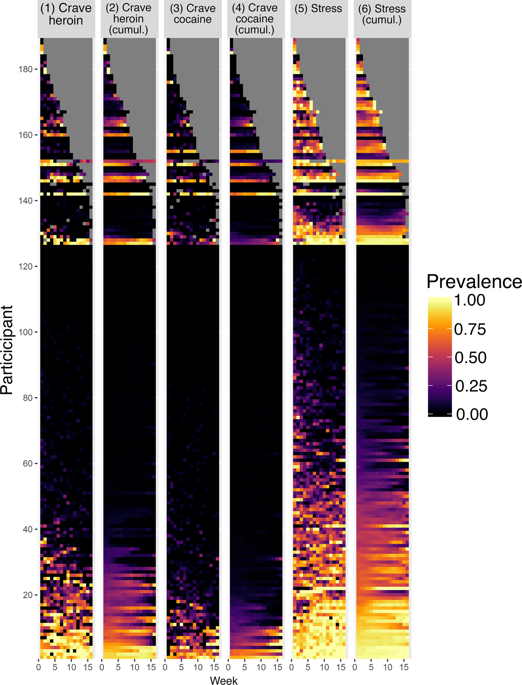npj Digital Medicine ( IF 12.4 ) Pub Date : 2020-03-04 , DOI: 10.1038/s41746-020-0234-6 David H Epstein 1 , Matthew Tyburski 1 , William J Kowalczyk 1 , Albert J Burgess-Hull 1 , Karran A Phillips 1 , Brenda L Curtis 1 , Kenzie L Preston 1

|
Just-in-time adaptive interventions (JITAIs), typically smartphone apps, learn to deliver therapeutic content when users need it. The challenge is to “push” content at algorithmically chosen moments without making users trigger it with effortful input. We trained a randomForest algorithm to predict heroin craving, cocaine craving, or stress (reported via smartphone app 3x/day) 90 min into the future, using 16 weeks of field data from 189 outpatients being treated for opioid-use disorder. We used only one form of continuous input (along with person-level demographic data), collected passively: an indicator of environmental exposures along the past 5 h of movement, as assessed by GPS. Our models achieved excellent overall accuracy—as high as 0.93 by the end of 16 weeks of tailoring—but this was driven mostly by correct predictions of absence. For predictions of presence, “believability” (positive predictive value, PPV) usually peaked in the high 0.70s toward the end of the 16 weeks. When the prediction target was more rare, PPV was lower. Our findings complement those of other investigators who use machine learning with more broadly based “digital phenotyping” inputs to predict or detect mental and behavioral events. When target events are comparatively subtle, like stress or drug craving, accurate detection or prediction probably needs effortful input from users, not passive monitoring alone. We discuss ways in which accuracy is difficult to achieve or even assess, and warn that high overall accuracy (including high specificity) can mask the abundance of false alarms that low PPV reveals.
中文翻译:

利用被动收集的 GPS 数据预测未来 90 分钟的压力和药物渴望
及时适应性干预(JITAI),通常是智能手机应用程序,学会在用户需要时提供治疗内容。面临的挑战是在算法选择的时刻“推送”内容,而不会让用户通过费力的输入来触发它。我们使用来自 189 名接受阿片类药物使用障碍治疗的门诊患者 16 周的现场数据,训练了一种 randomForest 算法来预测未来 90 分钟的海洛因渴望、可卡因渴望或压力(通过智能手机应用程序报告 3 次/天)。我们仅使用一种被动收集的连续输入形式(以及个人人口统计数据):通过 GPS 评估的过去 5 小时移动中的环境暴露指标。我们的模型实现了出色的整体准确率——在 16 周的定制结束时高达 0.93——但这主要是由正确的缺勤预测推动的。对于存在预测,“可信度”(阳性预测值,PPV)通常在 16 周结束时达到 0.70 的峰值。当预测目标越稀有时,PPV 越低。我们的研究结果补充了其他研究人员的研究结果,他们使用机器学习和更广泛的“数字表型”输入来预测或检测心理和行为事件。当目标事件相对微妙时,例如压力或药物渴望,准确的检测或预测可能需要用户的努力输入,而不仅仅是被动监控。我们讨论了难以实现甚至评估准确性的方式,并警告说,高总体准确性(包括高特异性)可能会掩盖低 PPV 所揭示的大量误报。











































 京公网安备 11010802027423号
京公网安备 11010802027423号